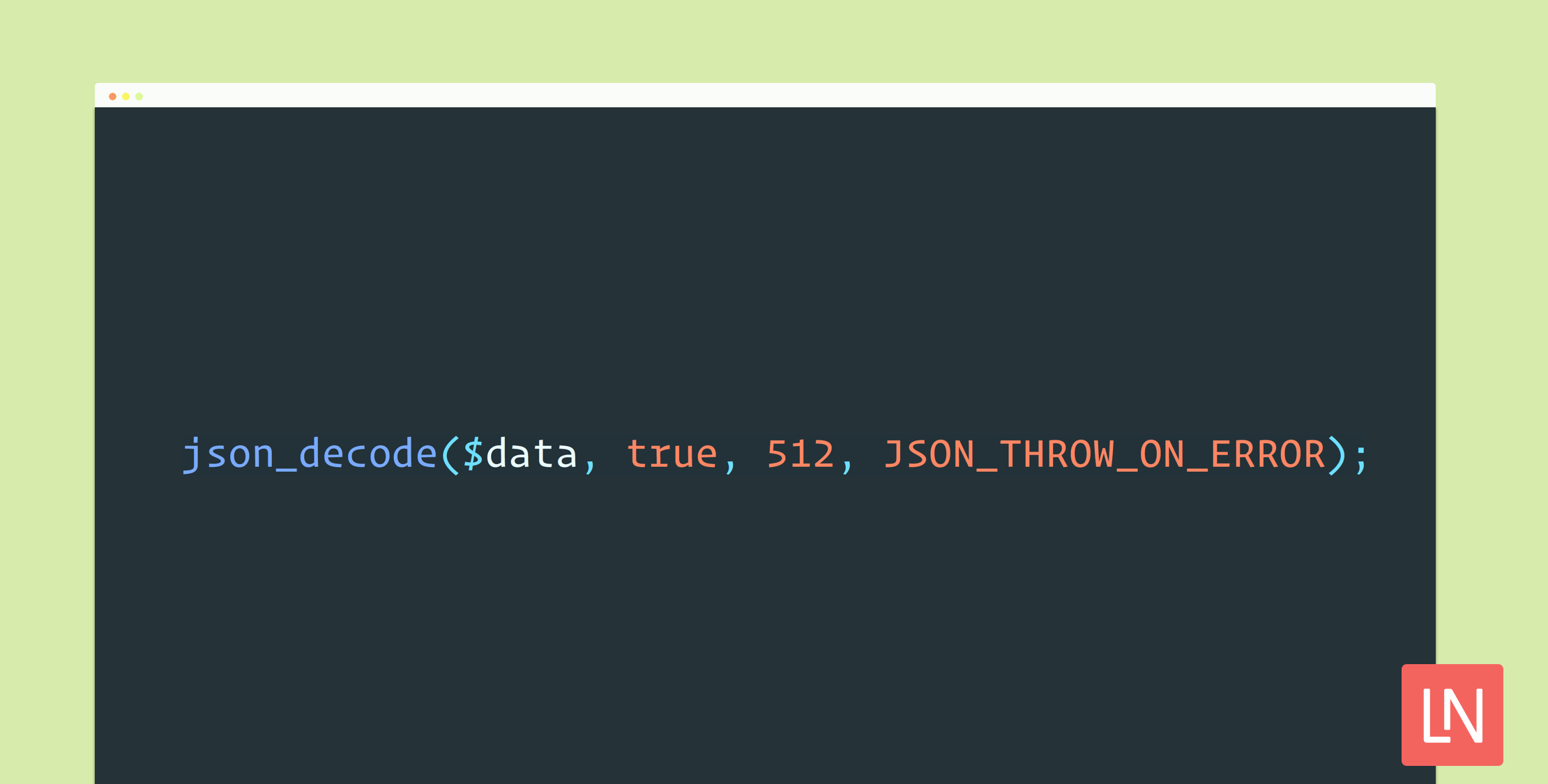One of the new features coming to PHP 7.3 is better error handling for json_encode() and json_decode(). The RFC was unanimously accepted by a 23 to 0 vote. Let’s take a look at how we handle JSON errors in <= PHP 7.2, and the new improvements coming in PHP 7.3.
Background
In the current stable, PHP v7.2, if you want to determine if JSON is invalid, you have to use the json_last_error() function to verify:
>>> json_decode("{");=> null>>> json_last_error();=> 4>>> json_last_error() === JSON_ERROR_NONE=> false>>> json_last_error_msg()=> "Syntax error"For example, in the Laravel Illuminate\Encryption\Encrypter class here’s a check to make sure calling json_encode() doesn’t result in an error:
// Once we get the encrypted value we'll go ahead and base64_encode the input// vector and create the MAC for the encrypted value so we can then verify// its authenticity. Then, we'll JSON the data into the "payload" array.$json = json_encode(compact('iv', 'value', 'mac')); if (json_last_error() !== JSON_ERROR_NONE) { throw new EncryptException('Could not encrypt the data.');} return base64_encode($json);We can at least determine if JSON encoding/decoding had an error, but it’s a little clunky compared to throwing an exception, which packages the error code and message neatly together.
Although you have to opt-in, v7.3 has an excellent way of allowing you to catch and handle JSON exceptions—let’s check out the new flag we can use!
The Throw on Error Flag in PHP 7.3
With the new option flag JSON_THROW_ON_ERROR it’s possible to rewrite this block of code with a try/catch. Maybe some something like the following:
use JsonException; try { $json = json_encode(compact('iv', 'value', 'mac'), JSON_THROW_ON_ERROR); return base64_encode($json);} catch (JsonException $e) { throw new EncryptException('Could not encrypt the data.', 0, $e);}I think this new style is especially useful for userland code when you receive some JSON data and instead of digging around for json_last_error() and the matching flag, your JSON encoding and decoding can take advantage of the error handler.
The json_decode() function has a few more arguments, and will look something like the following in PHP 7.3 if you want to take advantage of error handling:
use JsonException; try { return json_decode($jsonString, $assoc = true, $depth = 512, JSON_THROW_ON_ERROR);} catch (JsonException $e) { // Handle the JSON Exception} // Or even just let it bubble up... /** * Decode a JSON string into an array * * @return array * @throws JsonException */function decode($jsonString) { return json_decode($jsonString, $assoc = true, $depth = 512, JSON_THROW_ON_ERROR);}Getting the Error Code and Message
Previously you retrieve the JSON error code and message using the following functions:
// Error codejson_last_error(); // Human-friendly messagejson_last_error_msg();If you use the new JSON_THROW_ON_ERROR flag, here’s how you’ll get the code and message:
try { return json_decode($jsonString, $assoc = true, $depth = 512, JSON_THROW_ON_ERROR);} catch (JsonException $e) { $e->getMessage(); // like json_last_error_msg() $e->getCode(); // like json_last_error()}See the base Exception class for more API details, the JsonException exception is a subclass of Exception.
JSON’s Default Behavior in PHP 7.3
When upgrading to PHP 7.3, your code will be backward compatible on day one and continue to work as expected.
PHP’s default json_encode|decode() behavior hasn’t changed, the throw on error RFC adds a new option and exception class.
Learn More
You can learn all about the most prominent features coming to PHP 7.3 in our post announcing the PHP 7.3 Alpha 1 release last week. Also, read through the RFC for JSON_THROW_ON_ERROR for full details on the proposal coming to PHP 7.3.











